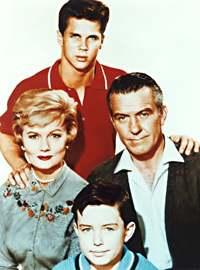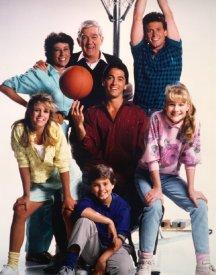The De-Evolution of TV
Cheese for everyone! From the garden state, the vacation spot of tomorrow, a place where only the strong survive, it's the one...the only...High Cheese. Thank you. Thank you. Thank you. You all look wonderful tonight. Give yourselves a hand!
TV is just not what it used to be. I mean think about it. TV has actually crept from one polar opposite to another. It used to be ideals and escapism, now it is "reality" and stupidity. I don't glorify either as the ideal, but simply offer up that TV has changed. Take for instance some key shows.
 Leave it to Beaver
Leave it to BeaverOctober 4, 1957 - September 12, 1963
In a golden age, jame-packed with denial about racism, poilio, and a host of other issues, TV was a place where nostalgic, white, people could chase their dreams. Leave it to Beaver was built on the powerful mythos of the perfect fifties family. You know, parents never raised their voices, nor were they ever too busy for the kids. Of course their dad, Ward (played by Methodist lay-minister Hugh Beaumont), was an accountant who amazingly didn't ever have to work late (read: laid off, not telling his old lady, but putting his hours in at the local bar), and their mom always wore a dress and heels and had her hair done perfectly (read: closet crank addict), despite never leaving the kitchen or the laundry room. The show focused on the lives of the children, and in particular, Beaver (Jerry Mather, who only got less cute), whose life began being chronicled as he hit the second grade. His big brother Wally (Tony Dow, who looks possessed in the picture above) was an eighth grader then, but became a football stud in highschool (of course, right?). Beaver's best friend, Eddie Haskell (Ken Osmond) was a suck-up to the Cleaver parents, but always got the Beav into some hairbrained kind of ordeal.
Sure, things were a little simplistic in this kid's-eye-view of life in the ficticiously perfect Mayfield, so major travesties and crises consisted of a bad grade, eating vegetables, or liking a girl. Still, the Cleavers inspired something in the American public--they were ideal, they were right, they were the unreachable goal. They were the family everyone wanted to be.
Is it coincidence that John F. Kennedy was assisnated less than a month after Leave it to Beaver went off the air? Most probably, but interesting none-the-less. Charles in Charge
Charles in Charge
October 3, 1984 - December 8, 1990
A 19-year-old college student, Charles (Scott Baio - who went on to be revealed as the antichrist) takes a job as the live-in baby-sitter (read: sorting out his own gender confusion issues) for a busy working yuppie couple. In exchange for a room, board,and a little spending money (read: enough to do anything he wanted...ever), Charles' job was to try and control--or...take charge of--Stan and Jill Pembroke's three rambunctious kids (read: brats): typical teenager and boy-crazy Lila (14); overly intelligent and highly sarcastic Douglas(12); and the cute yet comedic Jason (10). Charles, although at times daunted by his task, persevered at his job, as well as working hard at his studies. He still found time enough to hang out with his best friend Buddy (Willie Aames), as well as to pursue the girl of his dreams, the gorgeous Gwendolyn.  Not long into the show, the Pembrokes moved to Seattle (read: got their pink-slips from the studio) and sold their house and male-babysitter (read: slavetrade) to the Powells,who became Charles' new employers, not to mention housemates (read: more people with no problem with the live-in frat-boy). Mr. Powell was a Navy commander stationed in the South Seas. His father Walter ran the house (read: was why Mr. Powell gladly took his post in the South Seas). Also in the house were Mrs. Ellen Powell, and her three kids,Jamie (14, it should matter not that Nicole Eggert looked 22 att he time of filming), Sarah (13), and Adam (12). Jamie was of course, boy-crazy; Sarah was a late bloomer; and Adam was a soulless clone of Jason Pembroke. Don't you fear though, Buddy was still around to ham it up whenever needed.
Not long into the show, the Pembrokes moved to Seattle (read: got their pink-slips from the studio) and sold their house and male-babysitter (read: slavetrade) to the Powells,who became Charles' new employers, not to mention housemates (read: more people with no problem with the live-in frat-boy). Mr. Powell was a Navy commander stationed in the South Seas. His father Walter ran the house (read: was why Mr. Powell gladly took his post in the South Seas). Also in the house were Mrs. Ellen Powell, and her three kids,Jamie (14, it should matter not that Nicole Eggert looked 22 att he time of filming), Sarah (13), and Adam (12). Jamie was of course, boy-crazy; Sarah was a late bloomer; and Adam was a soulless clone of Jason Pembroke. Don't you fear though, Buddy was still around to ham it up whenever needed.
Eventually, Charle's mom came and moved to town, buying the local hangout spot (read: ruining his frat-boy male-babysitting dream--puppies and kids, he knew the tricks of the trade). He found a new love interest, Stephanie. In the final episode, he was accepted into Princeton's graduate school fulfilling a life-long dream.
Folks, this is situational comedy. You take some circumstance in life that wouldn't happen--like say putting a college freshman guy in charge of, and now living with, your boy-crazy teen-age daughter and your other two kids; and then selling your house and your babysitter to another family with an even wilder teenage daughter--and you build a whole story around it. "That would never happen," you say. Pshaw. They also said that Chachi would never be employed again, but look at who is actually in charge here--Scott "Big Boys" Baio. Get used to gettin' served a trip down impossible avenue every day at 4pm. It's okay that nothing on this show has any connection with reality, because Charles is "in charge of our days and our nights...of our wrongs and our rights"
Interesting side note: Charles' best friend, Buddy, has an interesting story. Not only was he one of the middle children on Eight is Enough (another classic), he also has turned his life around. Allow me to quote:
"Years ago, at the height of his wildly successful acting career [to me this may be a bit of an exaggeration, but whaddaryagonnado, right?], Aames embraced the fast-paced, thrill-seeking Hollywood lifestyle and the life-threatening temptations that came with it. Today, a thankful, clean and sober Aames faithfully uses his talents to create quality family Christian programming as executive vice president of Pamplin Entertainment."
Don't believe it? There's more...
read for yourselves. Good for you, Buddy...Good for you.Is it coincidence that since Charles in Charge was taken off the air, Scott Baio has not had another lead role? No.
Friends
September 22, 1994 - May 6, 2004
Six stunningly beautiful type A personalities live in New York and enjoy a life without consistent jobs or paychecks inside the coolest and most expensive spacious city apartments imaginable. Life is jokingly serious, tough to handle, but hey--you got your friends here with you. This is the homage to the greatness that is never anyone's actual twenties. For most of us the twenties were spent working our tail off at a task that we wouldn't finish...ever, for less than we deserve because no one cares about you or thinks you know anything until you are in your thirties. Still, this show's best attribute, besides the incredibly gorgeous cast, was its willingness to laughingly look at the issues around us. Life was actually confronted pretty honestly through humor and slapstick. Suspending the financial reality of their situations in life was the foil necessary to get to dealing with various life subjects in a very post-modern way. With a catchy theme song, by the Deep Blue Something, and a cast of highly paid tabloid faves, this show was destined for greatness.
Is it coincidence that once Jen lost her Friends, she lost Brad? Yeah, pretty much.
Reality TV
1992 - present
I blame MTV. They started this genre now known as Reality Television. The real world was an interesting concept until we all clued into the fact that most people's real lives are not so great for hour-long primetime spots. So what do they do? The rip the reality out of reality. Instead of showing us these folks real lives, they show us what their lives would be like if they were forced to move to a city other than the one they actually live in, move into a tricked out pad complete with everything in the world, alongside several other transplants who have nothing in common except the potential to set each other off and a prpoensity towards low morals. These folks then get new jobs, new girlfriends and boyfriends, and then have to compete with their housemates for time in both the make-out hot tub and the confession cam room. Sounds very real life to me.
But not only do we want to see real people really ruin their lives and make terrible decisions, we want more...we want to know if they can be famous. Fox obliged with American Idol. This actually does speak a little to reality as it succinctly and effectively outlines America's gluttony for watching people's dreams crash and burn in the horrible acid-fire of Simon's honesty. This is why I like the first three episodes--once the real singers start, the show goes to crap in my book.
Nevertheless, we are once again struck by the unreality of it all. We are watching whether real people can become fake pop-star shells of what they used to be. They even let you know that singing is not the total package here, but a projected image is the deal maker.
Not to be outdone, Survivor, perhaps the most succesful of the reality genre, has taken reality to all new levels of non-reality. Here we take real people and plant them in the armpit of the world somewhere with rats and roaches to eat, the shirt on their back, and twenty new friends who would sell their soul for a burrito and a chance to vote them off the island. Life is like that I guess...oh wait! No it's not. Don't get me wrong, I enjoy my time with some friends watching Survivor, but reality is more than a stretch for this stuff.
Which brings us down to the Bachelor. The Bachelor actually outdoes Survivor in un-reality. how many bachelors actually have tewnty women line up, throw themselves at them, take their pick, get a million bucks for doing this, and then walk away from it all with no repercussions. That's real life! I mean, sure, if you're Jerry O'Connell's gayer little brother (the actual bachelor is pictured left--I don't know his name), then maybe you have a shot with some ladies, but honestly: there is nothing real about reality television.
Is it coincidence that the mortality rate has risen alongside the reality television era? I think not.
So what does all of this mean? What has happened to television and what has happened to us because of it. We began with idealistic, overly moralistic, simple, anecdotal hegemony. We travel through unreasonable and trivial situational settings that make us laugh, but ultimately don't have any real bearning on anything. Once we do encounter reality we have to make it something else otherwise we simply might have to face the crushing weight of actually living our lives in a real world.
Bottom line: Television is the way we deceive ourselves, and it has never been innocent.
That's why we have to trust more in blogs. I love you all.






1 Comments:
That is the longest blog in the history of blogging
July 25, 2005 10:45 AM
Post a Comment
<< Home